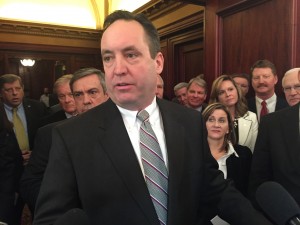Senate Republican leader isn’t ruling out gas tax
-
Marie Cusick

Marie Cusick / StateImpact Pennsylvania
State Senate GOP leader Jake Corman opposes Gov. Wolf’s severance tax plan, but isn’t ruling out some kind of new tax on drillers.
Governor Tom Wolf and state lawmakers are still at an impasse over the budget. Now, three weeks into the new fiscal year, Senate Majority Leader Jake Corman is signaling he may be open to one of Wolf’s top priorities– a new tax on gas drillers.
Corman (R- Centre) tells the Pittsburgh Tribune-Review he won’t rule out a new severance tax, but he also won’t support the plan Wolf is advocating for.
“If we can put together a package that benefits the industry, we might be willing to consider it,” Corman told the newspaper. But with gas prices so low he says, “we cannot take action that would damage this valuable vehicle for economic development and job creation. At the same time, if we could tailor a tax that may also have provisions that would allow the industry to continue to develop and maintain job growth, then it might be something we consider.”
Republican leaders met with Wolf on Monday, but emerged no closer to a budget deal. Wolf’s severance tax proposal calls for a five percent tax on the value of the gas, plus 4.7 cents for every thousand cubic feet. It would also set a minimum value of $2.97 per thousand cubic feet, regardless of the actual sale price. The governor wants use the money to boost funding to public education.
House Speaker Mike Turzai (R- Allegheny) remains strongly opposed to Wolf’s plan, which he says would amount to a “de facto moratorium on drilling.” Wolf emerged from Monday’s meeting and told reporters was “stunned” by Turzai’s opposition.
“He’d rather do good things for his friends in the oil and gas industry than find a way to fund schools,” said Wolf.
Pennsylvania is the only major gas-producing state in the nation that does not tax production. Although the notion of a severance tax has kicked around in Harrisburg for years, lawmakers settled on a special impact fee in 2012, which charges drillers on a per-well basis, rather than overall production. On average, the fees have brought in $213 million per year. The state’s Independent Fiscal Office has said the impact fee amounts to one of the lowest effective tax rates on shale gas in the nation, but that Wolf’s tax proposal would give Pennsylvania one of the highest rates.
















